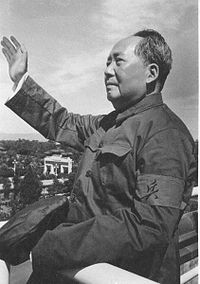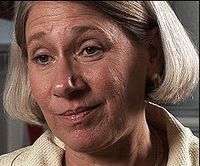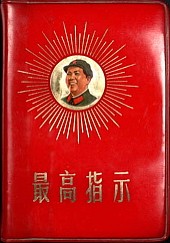Mao Zedong
 From Conservapedia
From Conservapedia | Mao Zedong | |
|---|---|

| |
| Personal life | |
| Date and place of birth | December 26, 1893 Shaoshan, Xiangtan, Hunan, Qing China |
| Parents | Mao Jen-sheng Wen Chi-mei |
| Claimed religion | Confucianism (rejected) Buddhism (rejected) Atheism |
| Education | Hunan Normal School Peking University |
| Spouse | Luo Yixiu (married 1907-1910) Yang Kaihui (married 1921-1927) He Zizhen (married 1928-1939) Jiang Qing: (married 1939-1976) |
| Children | Mao Anying (from Yang) Mao Anqing (from Yang) Li Min (from He) Li Na (from Jiang) |
| Date & Place of Death | September 9, 1976 Beijing, China |
| Manner of Death | Complications after heart attack |
| Place of burial | Chairman Mao Memorial Hall, Beijing, China |
| Dictatorial career | |
| Country | People's Republic of China |
| Military service | People's Liberation Army |
| Highest rank attained | Grand Marshal |
| Political beliefs | Communism Maoism Mao Zedong Thought |
| Political party | Communist Party of China |
| Date of dictatorship | October 1, 1949 |
| Wars started | Chinese Civil War Great Leap Forward Cultural Revolution |
| Number of deaths attributed | Great Leap Forward (low estimate 8,000,000, Deng Xiaoping claimed 16,000,000; Mao: The Unknown Story claimed 38,000,000)
Cultural Revolution (low estimate is 20,000,000; Mao: The Unknown Story claimed 35,000,000) |
| Mao Zedong | |||||||||
|---|---|---|---|---|---|---|---|---|---|
| Chinese | 毛泽东 | ||||||||
| |||||||||
Mao Zedong (December 26, 1893 – September 9, 1976), also known as Mao Tse-tung, was the leader of the Chinese Communists and a ruthless atheist dictator after he came to power in 1949. While not the founder, he was an early member of the Chinese Communist Party in 1921. In 1935, Mao was elected to the Executive Committee of the Comintern in Moscow and remained on this committee until it was publicly disbanded in 1943. Mao is regarded as perhaps the most prolific mass murderer in human history, not even counting the inummerable unborn female babies whom he callously slaughtered.[1]
Contents
Soviet national liberation movement[edit]
Edgar Snow, an admirer of the Chinese communists, introduced Mao and Zhou Enlai to American readers in 1937 in his book, Red Star Over China, shortly after the Chinese Red Army's rout by Chiang Kai-shek in 1934 and their year long retreat to Yenan known as the Long March. Snow wrote, "The political ideology, tactical line and theoretical leadership of the Chinese Communists have been under the close guidance, if not positive detailed direction, of the Communist International, which during the last decade has become virtually a bureau of the Russian Communist Party." And he further declared that the CCP had to subordinate itself to the "strategic requirements of Soviet Russia, under the leadership of Stalin."[2] In 1957, in ominous foreshadowing of his true callous nature, Mao Zedong boasted in his "American Imperialism is a Paper Tiger" speech regarding the prospect of China entering nuclear war that:
| "I’m not afraid of nuclear war. There are 2.7 billion people in the world; it doesn’t matter if some are killed. China has a population of 600 million; even if half of them are killed, there are still 300 million people left. I’m not afraid of anyone."[3] |
Mao defeated Chiang Kai-shek's Nationalists, taking control of the Chinese mainland and establishing the so-called People's Republic of China.
Three Years of Disasters[edit]
As the leader of China, Mao initiated the Great Leap Forward, an economic plan intended to rapidly industrialize China's then largely rural economy. This led to an unprecedented famine. Deng Xiaoping claimed the death toll to be 16 million, while the lowest estimate is 8 million [4] One cause was his 'Four Pests' campaign, which listed rats, flies, mosquitoes, and sparrows. Because killing the sparrows encouraged insects to take out more crops, ornithologist Tso-hsin Cheng asked him to stop.
Cult of personality[edit]
The East Is Red is a song that was the de facto anthem of the People's Republic of China during the Cultural Revolution in the 1960s.
| The East is Red, the sun is rising.
From China, appears Mao Zedong. He strives for the people's happiness, Hurrah, he is the people's great saviour! Chairman Mao loves the people, He is our guide to building a New China Hurrah, lead us forward! The Communist Party is like the sun, Wherever it shines, it is bright Wherever the Communist Party is Hurrah, the people are liberated! |
Cultural Revolution[edit]
From 1966 to 1976, Mao instigated the Cultural Revolution, in which those disloyal to the Chairman were killed or humiliated in order to solidify Mao's control. The low estimate for the death toll is 20 million.
Mao was discredited by the failure of the Great Leap Forward, and power shifted to the party boss Liu Shaoqi and his protégé, Deng Xiaoping. Dissatisfied with China's new direction and his own reduced authority, Mao launched a massive political attack on Liu, Deng, and other pragmatists in the spring of 1966.
In the early stages of the Cultural Revolution, Mao and Lin Biao charged Liu, Deng, and other top party leaders with dragging China back toward capitalism. In 1971, Lin Biao was accused of plotting against Mao. He fled Beijing and died in a plane crash in Mongolia.
The ideological struggle between more pragmatic, veteran party officials and the radicals re-emerged with a vengeance in late 1975. Mao's wife, Jiang Qing, and three close Cultural Revolution associates (later dubbed the "Gang of Four") launched a campaign against Deng, who was stripped of all official positions.
Mass Murder[edit]
Estimates vary for the death toll of Mao's regime, as the low estimate for the Great Leap Forward is 8 million though Deng Xiaoping claimed 16 million, as the low estimate for the Cultural Revolution is 20 million.
According to The Washington Post (7/14/94):
| While most scholars are reluctant to estimate a total number of "unnatural deaths" in China under Mao, evidence shows he was in some way responsible for at least 40 million deaths and perhaps 80 million or more. This includes deaths he was directly responsible for and deaths resulting from disastrous policies he refused to change. |
| One government document that has been internally circulated and seen by a former Communist Party official now at Princeton University says that 80 million died unnatural deaths – most of them in the famine following the Great Leap Forward. This figure comes from the Tigaisuo, or the System Reform Institute, which was led by Zhao Ziyang, the deposed Communist Party chief, in the 1980s to study how to reform Chinese society. |
In comparison, Hitler is blamed for 12 million concentration camp deaths and at least 30 million other deaths associated with World War II, while Stalin is believed responsible for between 30 million and 40 million “unnatural deaths,” including millions from a famine he created.
The article also added:

| Sources of new information on the famine indicate it was more widespread than long believed and could have been avoided. |
| — An article appearing last year in the Shanghai University journal Society stated that at least 40 million died from 1959 to 1961. Previous estimates have ranged from 10 million to 30 million. The article noted a mistake in government population statistics for 1960 that led to an underestimation of "unnatural deaths." Authorities later banned this issue of the journal and withdrew it from circulation. |
| — In another study, National Defense University professor Cong Jin estimated that 40 million died between 1959 and 1961. |
| — Chen Yizi of Princeton University’s Center for Modern China did research for years in China, first as a student and then as a government official, and determined that 43 million had died in the famine, a figure recently matched by a report from a think tank in Shanghai. According to Chen, this made the total number of Chinese who died as a result of Mao’s policies 80 million.[7] |
Chairman Mao bluntly said,
| “What can Emperor Qin Shi Huang brag about? He only killed 460 Confucian scholars, but we killed 46,000 intellectuals. There are people who accuse us of practicing dictatorship like Emperor Qin Shi Huang, and we admit to it all. It fits the reality. It is a pity that they did not give us enough credit, so we need to add to it.”[8] |
This confirms the accuracy of democide analyst R.J. Rummel's research on China, who was citing the book Mao: The Unknown Story by Jung Chung and Jon Halliday. Taking every available estimate of Chinese democide by category and time period; averaging them out and adding them together; repeating the process several times; doing the same with other Communist states and comparing the results; Rummel estimated 77,000,000 Chinese were killed by Mao Tse-Tung, assuming 38 million famine-dead from 1959–61.[9] Mao was responsible for more deaths than Stalin, Hitler, Pol Pot, Ceausescu, and Tito combined. Despite this massive body count, Mao remains an icon for certain segments of the far-left. For example, his likeness and books are often seen at Occupy Wall Street events.

Little Red Book[edit]
Mao is the author of Quotations from Chairman Mao, published in 1966, informally known as "the little red book." During his lifetime, almost everyone in the People's Republic of China was expected to have a copy. One of his most well known statements was that "political power grows out of the barrel of a gun".
Legacy[edit]
In their book Mao: The Unknown Story, authors Jung Chang and Jon Halliday state that in his first five years of power, 700,000 were claimed by Mao to be dead, but another 700,000 died in local excesses and 700,000 committed suicide out of fear of Mao. During the Great Leap Forward, Mao deliberately killed peasants by shipping food to the USSR and Eastern Europe in exchange for aid in building arms plants. As well, Mao's plans for peasants to make steel and build canals meant that in 1959-60 nobody grew any food. Thus, the worst famine in history occurred. Huge numbers were killed by puppets of Mao in the Cultural Revolution, which actually was launched to get rid of Mao's rivals in the Chinese Communist Party.
Despite killing far more people than Stalin and Hitler combined, Mao Zedong has often been held in high-regard by various leftists, with French Existential philosopher Jean-Paul Sartre claiming his revolution was "profoundly moral", and French feminist Simone de Beauvoir claiming that his actions were little different from Franklin Delano Roosevelt's policies in an approving tone.[10] Infamously, his image has even been used, similar to another leftist icon Che Guevara, in various merchandising, including a restaurant in Hollywood called "Mao's Kitchen." Kai Chen, a Chinese basketball player who fled China, has stated that the promotion of Mao was tasteless, stating it's like someone deciding to open a restaurant called Hitler's Kitchen.[11]
Mao Zedong and Traditional Chinese medicine[edit]
See also: Atheism and medicine and Atheism and health The efficacy of Chinese herbal medicine is poorly researched and supported.[12]
Mao Zedong revived and heavily promoted Traditional Chinese medicine (TCM) in China. He didn't believe in it himself, but pushed it as a cheap alternative to real medicine.[13]
China has been aggressively promoting TCM on the international stage both for expanding its global influence and for profit.[14]
Quotes[edit]
- "If we were to add up all the landlords, rich peasants, counterrevolutionaries, bad elements and rightists, their number would reach thirty million... Of our total population of six hundred million people, these thirty million are only one out of twenty. So what is there to be afraid of? ... We have so many people. We can afford to lose a few. What difference does it make?"[15]
- "You’d better have less conscience. Some of our comrades have too much mercy, not enough brutality, which means that they are not so Marxist. On this matter, we indeed have no conscience! Marxism is that brutal.”[16]
See also[edit]
- Darwin-Stalin connection
- List of dictators
- Friendly dictator
- Dictatorship of the proletariat
- List of Communist States
- List of Socialist States
- Death toll of communism
- Far Left
- Cult of personality
- Long march through the institutions
- Mobocracy, Social Effects of the Theory of Evolution
References[edit]
- ↑ "20th Century Democide". hawaii.edu. Retrieved on 20 October 2015.
- ↑ Red Star Over China by Edgar Snow, New York, 1937.
- ↑ https://www.theepochtimes.com/maos-nuclear-mass-extinction-speech-aired-on-chinese-tv_4758.html
- ↑ Mao: The Real Story by Alexander P. Pantsov with Steven I. Levine, pg. 472
- ↑ https://legalinsurrection.com/2019/04/back-to-the-future-biden-hires-anita-dunn-former-obama-adviser-who-praised-mao/
- ↑ Video of Obama Communications Director Claiming Mao One of Her Favorite Political Philosophers' Video, YouTube. Retrieved October 29, 2009.
- ↑ "Uncounted Millions". paulbogdanor.com. Retrieved on 20 October 2015.
- ↑ http://www.ninecommentaries.com/english-3
- ↑ "20th Century Democide". hawaii.edu. Retrieved on 20 October 2015.
- ↑ https://www.christianpost.com/news/chairman-mao-s-reign-of-terror-151-finally-the-truth-comes-out-6475/
- ↑ https://www.youtube.com/watch?v=tPl9Go3hHDI
- ↑ Shang, A.; Huwiler, K.; Nartey, L.; Jüni, P.; Egger, M. (2007). "Placebo-controlled trials of Chinese herbal medicine and conventional medicine comparative study". International Journal of Epidemiology. 36 (5): 1086–92. doi:10.1093/ije/dym119. PMID 17602184.
- ↑ WHO Endorses Traditional Chinese Medicine. Expect Deaths To Rise by Steven Salzberg, Forbes magazine
- ↑ WHO Endorses Traditional Chinese Medicine. Expect Deaths To Rise by Steven Salzberg, Forbes magazine
- ↑ Li Zhisui, The Private Life of Chairman Mao [Random House, 1994], p. 217.
- ↑ Jung Chang and Jon Halliday, Mao: The Unknown Story [Jonathan Cape, 2005], p. 411.
Further reading[edit]
- Chang, Jung and Jon Halliday. Mao: The Unknown Story, (2005), 814 pages, ISBN 0-679-42271-4
- Clark, Paul. The Chinese Cultural Revolution: A History (2008), a favorable look at artistic production excerpt and text search
- Dietrich, Craig. People's China: A Brief History, 3d ed. (1997), 398pp excerpt and text search
- Esherick, Joseph W.; Pickowicz, Paul G.; and Walder, Andrew G., eds. The Chinese Cultural Revolution as History. (2006). 382 pp. excerpt and text search
- Fairbank, John King and Goldman, Merle. China: A New History. (2nd ed. 2006). 640 pp. excerpt and text search
- Hsü, Immanuel Chung-yueh. The Rise of Modern China, 6th ed. (1999), highly detailed coverage of 1644–1999, in 1136pp. excerpt and text search
- Jian, Guo; Song, Yongyi; and Zhou, Yuan. Historical Dictionary of the Chinese Cultural Revolution. (2006). 433 pp.
- MacFarquhar, Roderick and Fairbank, John K., eds. The Cambridge History of China. Vol. 15: The People's Republic, Part 2: Revolutions within the Chinese Revolution, 1966-1982. (1992). 1108 pp.
- MacFarquhar, Roderick and Michael Schoenhals. Mao's Last Revolution. (2006).
- MacFarquhar, Roderick. The Origins of the Cultural Revolution. Vol. 3: The Coming of the Cataclysm, 1961-1966. (1998). 733 pp.
- Meisner, Maurice. Mao's China and After: A History of the People’s Republic, 3rd ed. (1999), dense book with theoretical and political science approach. excerpt and text search
- Schoppa, R. Keith. The Columbia Guide to Modern Chinese History. Columbia U. Press, 2000. 356 pp. online edition from Questia
- Spence, Jonathan D. The Search for Modern China (1991), 876pp; well written survey from 1644 to 1980s excerpt and text search; complete edition online at Questia
- Spence, Jonatham. Mao Zedong (1999) excerpt and text search
- Shuyun, Sun. The Long March: The True History of Communist China's Founding Myth (2007)
- Taylor, Jay. The Generalissimo: Chiang Kai-Shek and the Struggle for Modern China (2009), 722 pp. highly favorable scholarly biography of Mao's great enemy
- Wang, Ke-wen, ed. Modern China: An Encyclopedia of History, Culture, and Nationalism. (1998). 442 pp.
- Xia, Yafeng. "The Study of Cold War International History in China: A Review of the Last Twenty Years," Journal of Cold War Studies10#1 Winter 2008, pp. 81–115 in Project Muse
- Yan, Jiaqi and Gao, Gao. Turbulent Decade: A History of the Cultural Revolution. (1996). 736 pp.
- Studies of Modern Chinese History: Reviews and Historiographical Essays
Categories: [Atheists] [Chinese Politics] [Chinese History] [Communists] [Mass Murderers] [Liberals] [Marxism] [Dictators] [People's Republic of China] [Police State] [Welfare State] [Anti-American] [Terrorists] [Left-wing Nationalism] [Gun Control proponents] [Anti-Christianity] [War Criminals]
↧ Download as ZWI file | Last modified: 02/16/2023 05:32:45 | 44 views
☰ Source: https://www.conservapedia.com/Mao_Zedong | License: CC BY-SA 3.0
 ZWI signed:
ZWI signed:
 KSF
KSF